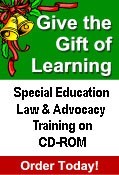|
|
Many readers write to ask if children with disabilities, including children with ADD/ADHD, are eligible for special education services. For many, the answer is a clear "Yes!" For others, the answer is "No!"
What about a child who has dyslexia or other learning disabilities?
Having a disability does not automatically qualify a child for special education services. Passing grades do not automatically disqualify a child for special education services.
In this issue of the Special Ed Advocate you'll find answers to a parent's questions about eligibility for services, the issue of passing grades and eligibility, and what to do to negotiate for services when the school says, "No!"
But first, a word about our Holiday Special ...
|
|
25% Off on All Wrightslaw Products! Sale Ends on 12/21 |
 Get 25% off all Wrightslaw books, DVDs, and multi-media training programs during our holiday special. Get 25% off all Wrightslaw books, DVDs, and multi-media training programs during our holiday special.
Yes! This special offer includes the multi-media training program and discounted bulk orders.
 Wrightslaw products make great gifts for friends, family members, teachers, and advocates. Click here to purchase a Gift Certificate. Wrightslaw products make great gifts for friends, family members, teachers, and advocates. Click here to purchase a Gift Certificate.
When you forward this offer to friends and colleagues, they will receive the 25% discount too.
This special offer ends on Sunday, December 21, 2008.
Order by December 18, 5:00 pm EST for Christmas delivery.
|
back to the top |
|
Does Your Child Meet the Legal Definition of "Child with a Disability" |
A child with a disability is not automatically eligible for special education and related services under IDEA. The key phrase is "who, by reason thereof, needs special education and related services."
Does your child's disability adversely affect educational performance?
To be eligible for a free, appropriate public education (FAPE) under the IDEA, the child must have a disability and must need special education and related services.
"My son has ADD. Our doctor told us to request special education services from the school. When we asked for special education help, the school said he is passing so he is not eligible for special ed."
The special ed law and regulations do not mention grades as a criteria for referring a child for a special education evaluation or finding a child eligible for special education services.
Think about it. If schools made these decisions based on a child’s grades, they could avoid providing services simply by giving all students passing grades!
What can a parent do? Find answers to this parent's questions and more information about eligibility for special education in the article "Is a Child with ADD/ADHD Eligible for Special Education?"
What Options Do You Have?
If the child has a disability but does not need special education services, the child may be entitled to protections under Section 504 of the Rehabilitation Act. |
back to the top |
|
Children Eligible under Other Health Impairment (OHI) and Specific Learning Disabilities |
Children with ADD/ADHD who are found eligible for special education usually fall under the "Other Health Impairment" or "Specific Learning Disabilities" categories.
The legal definition of "Other Health Impairment is "having limited strength, vitality, or alertness, including heightened alertness to environmental stimuli, that results in limited alertness with respect to the educational environment, that ... is due to chronic or acute health problems such as ... attention deficit disorder or attention deficit hyperactivity disorder ..."
Read more |
back to the top |
|
What About Dyslexia? |
Schools often tell parents that they are not required to provide special education services to children who have dyslexia. Is this true?
If you don't already know the answer to this question, you can look it up here.
Did you find "dyslexia" listed?
Yep! It's right after minimal brain dysfunction, the term used in the 1970's term for what we now refer to as "Attention Deficit Disorder." In fact, "dyslexia" has always been listed as a specific learning disability in the special education law.
Do you see why we tell parents and teachers that you must learn how to find answers to your questions in the law - and not rely on what others tell you? |
back to the top |
|
Eligibility of Children Who May Have Specific Learning Disabilities (SLD) |
The legal definition of "Specific Learning Disability" did not change under IDEA 2004. You'll find it in Regulation 300.8(c)(10).
But, Congress changed the requirements for eligibility and evaluations of children who may have specific learning disabilities.
Discrepancy v. Response to Intervention Models
Find out how the changes in IDEA 2004 may affect millions of children who have been identified with specific learning disabilities.
For information on response to intervention or response to instruction (RTI) models and discrepancy models, read IDEA 2004: Specific Learning Disabilities: Discrepancy v. Response to Intervention Models
|
back to the top |
|
|





 Get 25% off all Wrightslaw books, DVDs, and multi-media training programs during our holiday special.
Get 25% off all Wrightslaw books, DVDs, and multi-media training programs during our holiday special.


